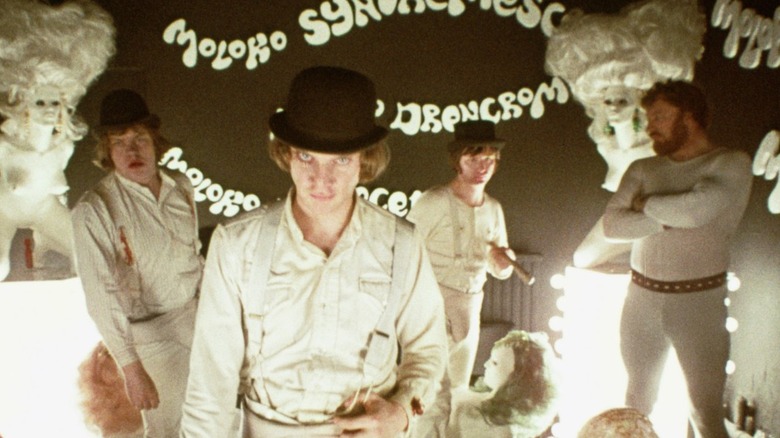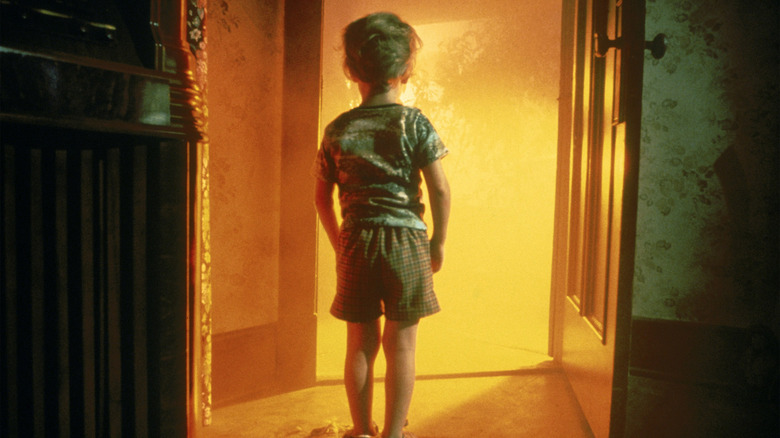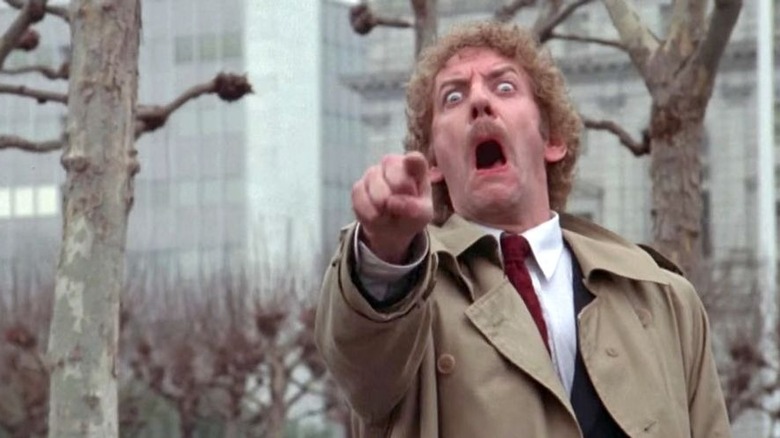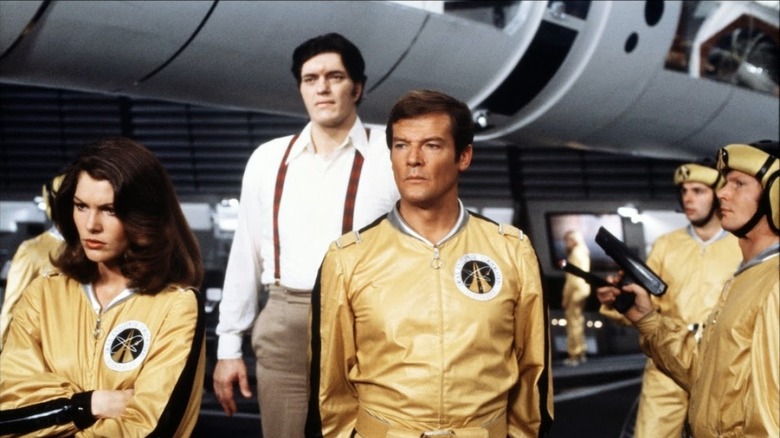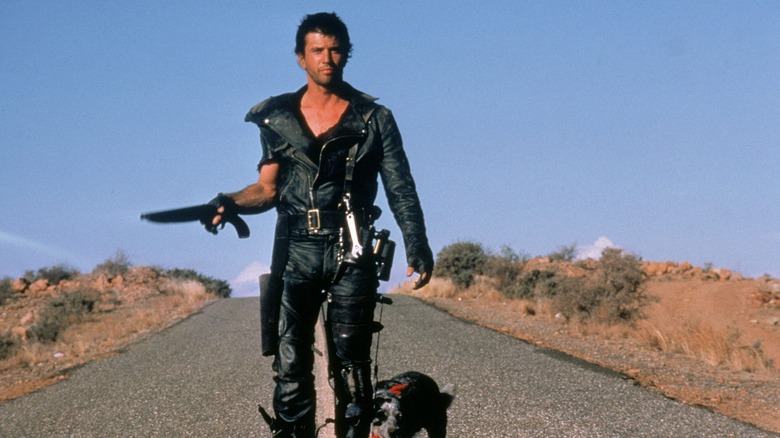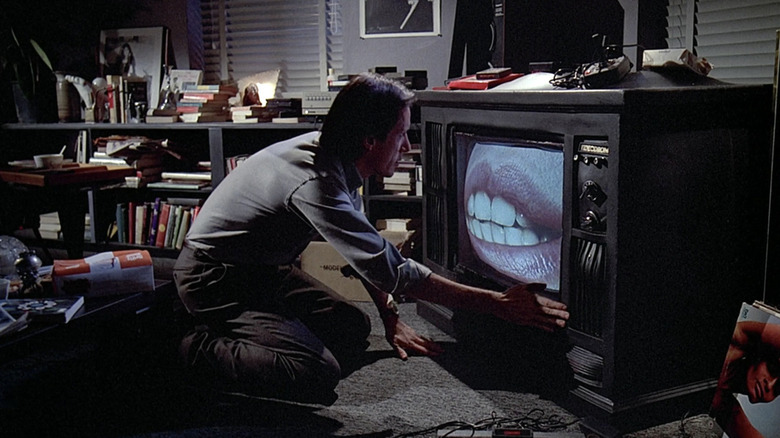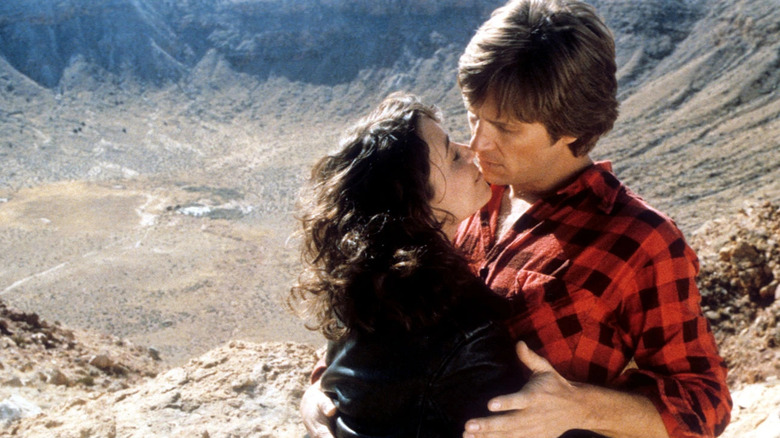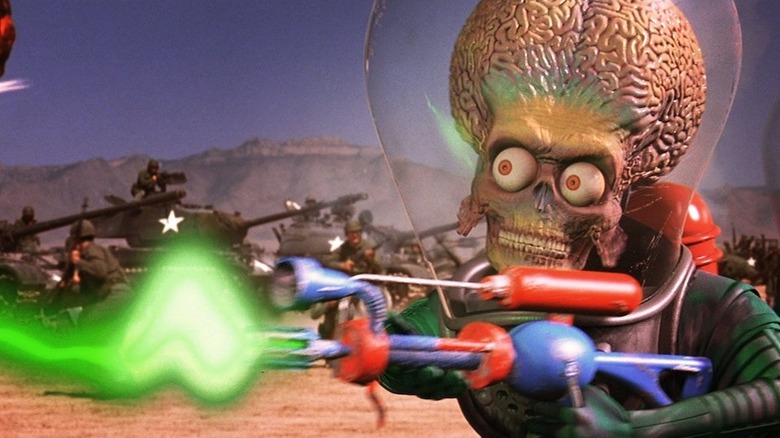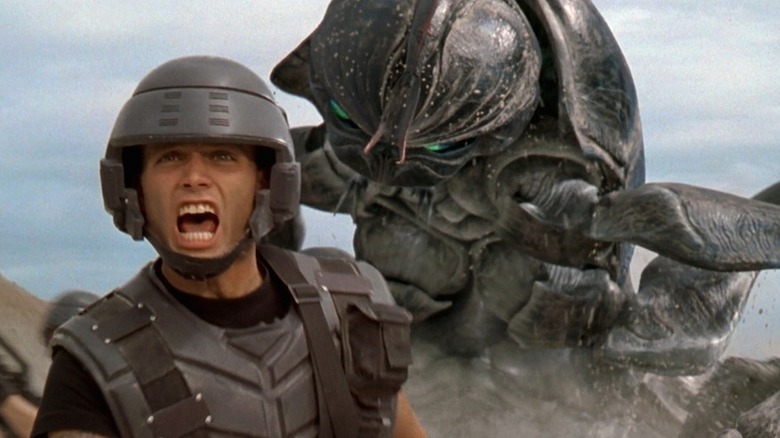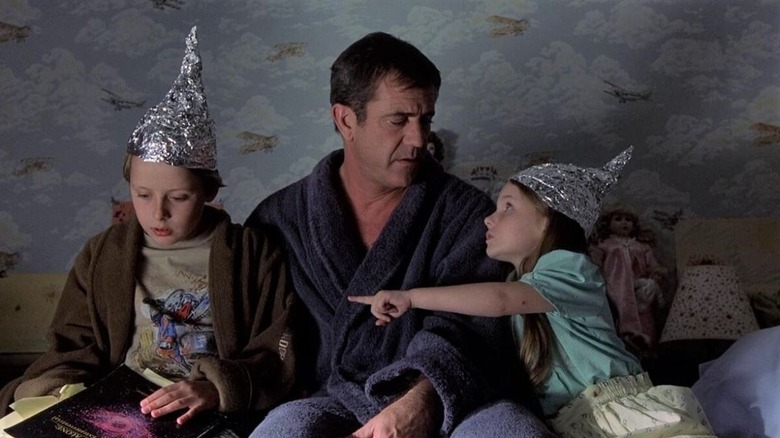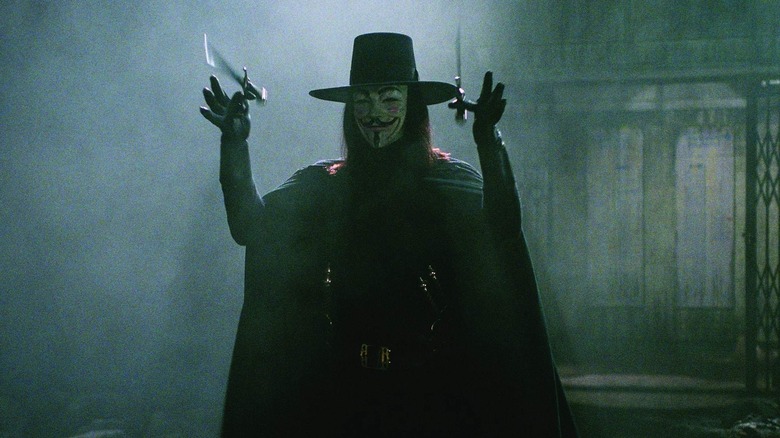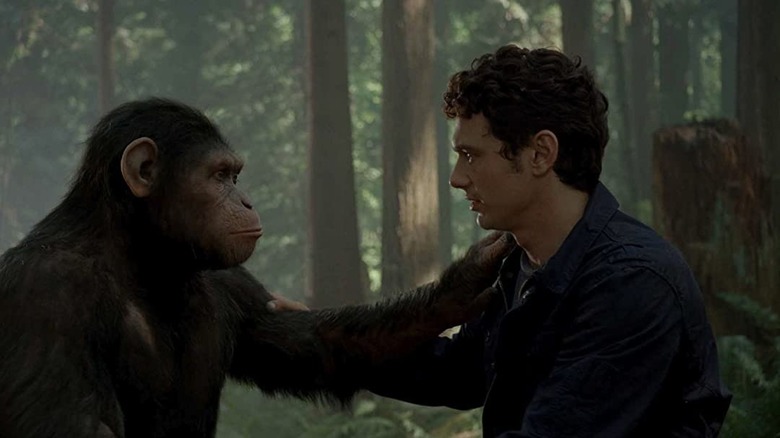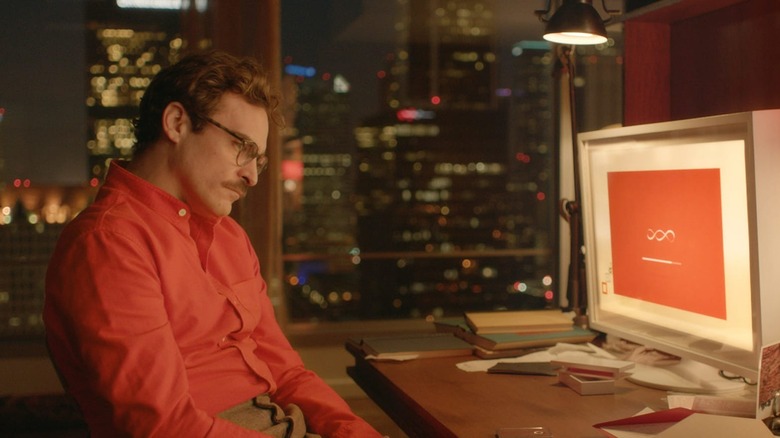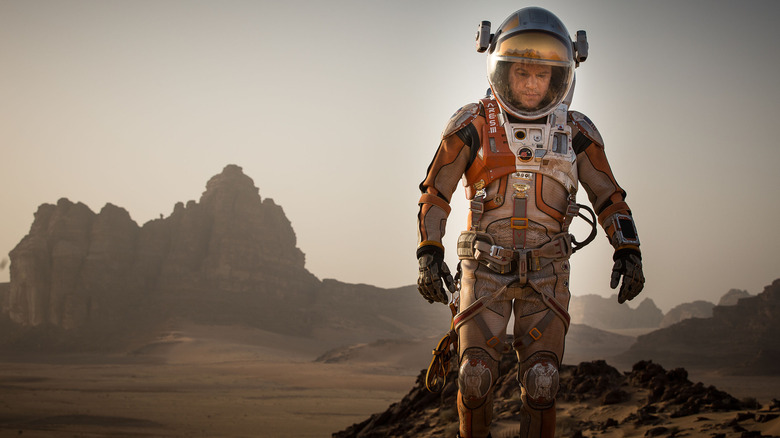The Best Sci-Fi Movies For People Who Don't Like Sci-Fi
Regardless of whether or not you are a science fiction fan, you have to acknowledge the importance of sci-fi films in the history of cinema. There is almost no way of appreciating modern special effects without examining the importance of Stanley Kubrick's work in 1968's "2001: A Space Odyssey."
Similarly, it's hard to understand the state of modern filmmaking without looking at the "Star Wars" franchise. The reinvention of classical mythology in a science fiction context laid the groundwork for many modern films. Even if you've never seen the original "Star Wars," you have probably learned a lot about the franchise through cultural osmosis. You don't have to be a "Star Wars" fan to know who Darth Vader, Chewbacca, R2-D2, C-3PO, or Yoda is.
However, it may be overwhelming for non-science fiction fans to start watching a franchise that they've never seen before. Let's say that you've never seen anything related to "Star Trek." Where would you start? Would you watch the original series, or would you skip straight to the movies? "Star Trek: The Motion Picture" assumes that the viewer has some background knowledge about the characters, so it might be a tough place to start. There are better ways to get skeptics interested in the genre. Here are the best sci-fi movies for people who don't like sci-fi.
A Clockwork Orange (1971)
Stanley Kubrick was a cinematic genius like no other. "2001: A Space Odyssey" is a definitive film in the history of cinema, but it may not be the best place to start for those that are skeptical about the science fiction genre. Although the film is brilliant, the deeply philosophical subtext may be a barrier for some audiences. However, Kubrick's other sci-fi masterwork, "A Clockwork Orange," is a far more suitable entry point. Although "A Clockwork Orange" takes place in a futuristic version of Great Britain, its themes of youth violence, police brutality, and the failure of institutions are eerily prophetic.
"A Clockwork Orange" follows a young protagonist named Alex DeLarge (Malcolm McDowell), who leads a gang of violent criminals to pillage and attack the citizens of London. Alex is captured by the government and subjected to behavioral conditioning that is meant to purge him of his violent tendencies. The more realistic tone of the film may interest those who are averse to seeing unrealistic technological advances.
Close Encounters of the Third Kind (1977)
Like Stanley Kubrick, Steven Spielberg is a pivotal filmmaker in the history of cinematic science fiction. "E.T. the Extra-Terrestrial" was a blockbuster that rivaled "Star Wars" in its historical importance and proved that sci-fi films could have a heart. Similarly, "Jurassic Park" was a game-changing box office sensation that reimagined what was possible using computer-generated imagery. These are classics that are certainly worth watching, but they're "hard" genre films that are unlikely to attract non-science fiction fans. However, Spielberg's first entry into the sci-fi genre is a perfect starting point. "Close Encounters of the Third Kind" is about the very nature of skepticism. The characters in the film are forced to examine the evidence when signs of extraterrestrial beings begin to emerge.
The aliens themselves don't appear until the final sequence of "Close Encounters of the Third Kind." The majority of the film focuses on human characters such as the electrician Roy Neary (Richard Dreyfuss) and his wife, Ronnie (Terri Garr). Spielberg takes the time to explore the family drama at the heart of the story.
Invasion of the Body Snatchers (1978)
The 1950s were an important decade for science fiction. Imagery such as UFOs, green aliens, and outer space battles began to emerge. However, Don Siegel's 1956 film, "Invasion of the Body Snatchers," offered searing political commentary as well as pure sci-fi horror. The paranoia that sweeps the world when humans are infected by aliens was an eerie parallel to the Red Scare and McCarthy-era blacklisting.
The original "Invasion of the Body Snatchers" should be praised for its political subtext, but it's still a relatively cheesy sci-fi thriller. That being said, the 1978 remake by Philip Kaufman shows no signs of campiness. Kaufman reimagined the themes of the original and used them as a metaphor for the fragile American political landscape of the 1970s. With the Watergate scandal and the war in Vietnam, Americans had more reason than ever before to be terrified that their neighbors were secretly plotting against them.
"Invasion of the Body Snatchers" sheds light on an important period of history. Even those that don't appreciate the science fiction elements should be able to find something valuable in the way the film presents its themes.
Moonraker (1979)
The James Bond franchise has always toyed with the line between fantasy and reality. Although the series has avoided anything supernatural, a good deal of 007's gadgets are fairly implausible. The early Sean Connery films feature technology that is far more advanced than anything that science could rationalize, and some of the films starring Roger Moore and Pierce Brosnan are absolutely ridiculous. The 2002 film "Die Another Day" even features an invisible car!
Bond officially went to space in the 1979 film "Moonraker." After the success of "Star Wars" in 1977, studios were desperate to create more films that could capitalize on the outer space fever. Ironically, Ian Fleming's original novel "Moonraker" is one of the more serious Bond books. That description does not apply to "Moonraker." The outer space adventure is maybe the silliest entry in the entire Bond franchise, and that's saying something.
However, non-science fiction fans may find it easier to get interested in the genre if they are already seeing a familiar franchise. Bond's humorous remarks about the implausibility of the situation allow the film to satirize how self-serious sci-fi can get.
Mad Max 2: The Road Warrior (1982)
"Mad Max" may take place in the future, but there's not a hint of idealism in it. George Miller's game-changing 1979 action classic shows how a seemingly civilized society can easily fall into chaos. "Mad Max" is grounded in a realistic world in which Main Force Patrol officer Max Rockatansky (Mel Gibson) watches a biker gang ravage his community. "Mad Max" slowly explains to the viewer how a science fiction world could emerge.
Miller's 1982 sequel, "Mad Max 2: The Road Warrior," takes place several years later. The Australian outback has been thrust into a violent battle for sparse resources. Miller's Western influences can be seen. "The Road Warrior" seems closer to one of John Wayne's gunslinger films than it does a sci-fi franchise like "Star Wars" or "Star Trek."
"The Road Warrior" is an action film, first and foremost. There's no hint of implausibility in the practical ways in which Miller constructs his chaotic action sequences. "The Road Warrior" is the perfect film to introduce viewers to the "Mad Max" franchise. The 2015 film "Mad Max: Fury Road" works from a model that "The Road Warrior" perfected.
Videodrome (1983)
There's versatility within the cinematic work of David Cronenberg. Cronenberg has made many sci-fi body horror films such as "Scanners," "Crimes of the Future," "The Brood," and "Rabid." However, he has also shown his awareness of political satire with films like "Cosmopolis," "Maps to the Stars," and "A Dangerous Method." "Videodrome," released in 1983, offers a happy medium between the two. It's a horrifying work of sci-fi that speaks to relevant themes about societal violence and indoctrination through media.
"Videodrome" centers on unlikeable UHF station programmer Max Renn (James Woods), who becomes fascinated by an unusual foreign broadcast. Max discovers an enigmatic program called "Videodrome," which depicts senseless acts of violence and torture. Max soon discovers that not only is the footage real, but it's being used as a front for a political movement. This is a disturbing parallel to modern fascism. "Videodrome" only goes in a sci-fi direction when the broadcast starts to "will" Max into committing violence himself. It is a metaphor for the way that political cults radicalize their members.
Starman (1984)
Movie fans may feel that every sci-fi film about aliens tends to go in a very predictable direction. We've all seen countless stories about aliens invading Earth and astronauts reaching extraterrestrial star systems. However, John Carpenter's 1984 science fiction film "Starman" doesn't go the standard route. Instead of focusing on intergalactic conflict or interplanetary travel, Carpenter tells a rather sweet love story in which the phrase "star-crossed" literally applies.
"Starman" follows the very relatable widow Jenny Hayden (Karen Allen), who is grieving the recent death of her husband, Scott (Jeff Bridges). Jenny is shocked to discover that an alien "Star Man" who looks exactly like her husband is on the run from government agents. "Starman" doesn't give a whole lot of details about this character's origins and focuses on how Jenny uses this new relationship to get over her grief. The excellent chemistry between Allen and Bridges makes "Starman" seem closer to a romantic drama than a "close encounter" sci-fi film.
Mars Attacks! (1996)
Non-science fiction fans may find that those that love the genre tend to take themselves a little too seriously. It's great whenever you find people that are passionate about franchises like "Star Wars," "Star Trek," Marvel, and DC, but you also have to acknowledge that these are all inherently silly properties. "Mars Attacks!" is a science fiction film for people who are tired of the "elevated" approach to the genre. Tim Burton's 1996 alien invasion movie lampoons the incompetency of politicians in the wake of a crisis, and that's a theme that holds up, regardless if aliens are involved
The U.S. government descends into chaos when a fleet of flying saucers starts wreaking havoc on Earth. The cowardly president, James Dale (Jack Nicholson), makes several attempts to broker a peaceful solution, but they all fail. Burton explores the nature of responsibility in a time of crisis. When the entire planet is threatened, it is the common people who are forced to stand up for good. Those in power have no idea what they are doing. Even if it's technically an "alien invasion" movie, "Mars Attacks!" draws parallels to realistic political conflicts.
Starship Troopers (1996)
There's a subgenre of military science fiction action films that may rub some viewers the wrong way. Even if a film claims to not take place in reality, it can be tough to hear jingoistic characters discuss their love of the military and swear blind oaths of patriotism. Filmmakers like Michael Bay and Roland Emmerich seem to celebrate warfare, even in their sci-fi films.
However, Paul Verhoeven was able to satirize the nature of military propaganda with his brilliant 1997 satire "Starship Troopers." If you've ever read the novel of the same name that the film is based on, don't worry. Verhoeven did not honor the militaristic roots of the book. Instead, he transformed the material into a warning about the cult-like nature of war.
As characters like Johnny Rico (Casper Van Dien), Carmen Ibanez (Denise Richards), and Carl Jenkins (Neil Patrick Harris) are indoctrinated into military culture, they begin to lose sight of their humanity. "Starship Troopers" belongs alongside great anti-war films like "Apocalypse Now" and "Full Metal Jacket," even if the war that it is depicting is a fictitious one.
Muppets from Space (1999)
Even if you don't like science fiction, you love the Muppets, right? The Muppets have reinvented themselves over multiple generations, and everyone has their favorite fuzzy performer. The films that star the Muppets do a remarkable job at taking their genres seriously. "The Great Muppet Caper" is a terrific mystery adventure, "The Muppets Take Manhattan" feels like a classic musical, "The Muppet Christmas Carol" is a very faithful adaptation of Charles Dickens' original story, and "Muppet Treasure Island" is genuinely one of the best pirate movies ever made.
"Muppets from Space" pokes fun at sci-fi, but its story is heartfelt and ties closely into "The Muppets" universe. Gonzo has always felt different and doesn't think that he belongs with the other Muppets anymore. Gonzo begins looking for his "real" family. When their friend goes missing, Kermit the Frog and the rest of the gang go on a search to find him.
While Gonzo's origins are revealed to be extraterrestrial, he ultimately discovers that the other Muppets are his real family. It's a very nice message that pays tribute to the character's history.
Signs (2002)
M. Night Shyamalan's name might be controversial now, but back in his prime, he epitomized the elevated approach to genre films. Even if you hate scary movies, "The Sixth Sense" is just as focused on family drama as it is on ghostly jump scares. Similarly, "Unbreakable" provides a realistic examination of superhero archetypes and how they are reflected in the modern world.
Even though "Signs" is a movie about an alien invasion, it is really a story about a crisis of faith. Former priest Graham Hess (Mel Gibson) leaves the Episcopal Church after his wife is killed in a car accident. Hess struggles to connect with his two children, Morgan (Rory Culkin) and Bo (Abigail Breslin). Graham's brother, Merrill (Joaquin Phoenix), has come to stay with them.
The film revolves around how this disenfranchised family comes together when they need each other most. It takes a larger threat to unite them. While it's an alien invasion in "Signs," that storyline could easily be substituted for a crisis like war or disease.
V for Vendetta (2005)
Watching any film about a fascist dictatorship is always a little bit unnerving. How close is this fictional premise to stories that dominate the news cycle? Alan Moore's groundbreaking graphic novel "V for Vendetta" explores the necessity of resistance in the face of fascism, xenophobia, racism, and systematic oppression. In the futuristic Britain of "V for Vendetta," the nation has fallen under the influence of government-sanctioned propaganda that disguises itself as news. That may be a little too familiar for some audiences to stomach. You may find yourself wishing that the film was more ridiculous.
"V for Vendetta" examines a future that isn't that far removed from our own time. The architecture, culture, and societal roles that exist in the film's version of reality look like they are only a few generations from the present day. Despite its science fiction premise, there is nothing unrealistic about the way that director James McTeigue constructs his action sequences. The brisk hand-to-hand combat is just as gut-wrenching as anything that you would see in a martial arts classic.
Rise of the Planet of the Apes (2011)
"Planet of the Apes" is one of the most popular science fiction franchises, but it might be an overwhelming place to start for non-sci-fi fans. You have to buy into the conceit that apes have created a civilization that is more advanced than human society. The futuristic premise and time travel elements make the story seem even more unrealistic. If you're looking for a more rational explanation, then don't look any further than the 2011 prequel film "Rise of the Planet of the Apes."
"Rise of the Planet of the Apes" takes place in the not-so-distant future. Chemist Dr. William Rodman (James Franco) is searching for a way to allow the human body to heal itself. William's father, Charles (John Lithgow), is suffering from severe Alzheimer's. William decides to test his experimental drug on an ape that he names "Caesar" (Andy Serkis). Caesar's brain doesn't just heal, it evolves, turning him into a super-intelligent character.
The film uses practical science to explain how the apes gain human intelligence. The film also focuses on relevant themes of animal rights and experimental drug treatments.
Her (2013)
We're all a little too in love with our phones, and the sci-fi film "Her" explores a world in which a man can form a relationship with an artificial intelligence program. Given the rapid advances in technology that are emerging every day, the future of "Her" doesn't seem that far-fetched. What's impressive is that writer-director Spike Jonze doesn't treat this story as tongue-in-cheek. He examines the nature of loneliness and how desperate people are to form real connections in a world where so many interactions are digital.
Theodore Twombly (Joaquin Phoenix) is recently divorced from his wife, Catherine Klausen (Rooney Mara). Theodore doesn't feel like he has anyone to talk to but decides to treat himself by purchasing an artificial intelligence operating system named Samantha (Scarlett Johansson). Although Samantha begins by simply serving Theodore's needs, she begins to evolve as he spills his heart to her. It's a sensitive look at how love can emerge in the unlikeliest of places.
The Martian (2015)
Science fiction films may be a roadblock for people that advocate for more realistic depictions of space travel in cinema. The exploration of space doesn't just belong to fantastical adventures like "Alien" and "Independence Day." There are realistic movies like "Apollo 13" and "First Man" that tell true stories of astronauts and their bravery. This is one of the reasons that Andy Weir's 2011 novel "The Martian" became such a sensation. Ridley Scott's 2015 film adaptation honors the pro-science message that Weir created.
The story revolves around astronaut Mark Watney (Matt Damon), a botanist on a NASA exploratory mission to Mars. During a chaotic storm, Mark's team assumes that he is dead and leaves him alone on the Martian surface. Mark has to use his wits to survive. The film goes into detail showing his scientific experiments. Mark grows his own crops, builds an environment that he can survive in, and communicates with NASA to coordinate his escape. The film has a positive message about how people from all walks of life can come together to save just one person.
The film's depiction of space technology was so realistic that NASA aided the production crew, thinking that the story could help inspire a new generation of astronauts.

